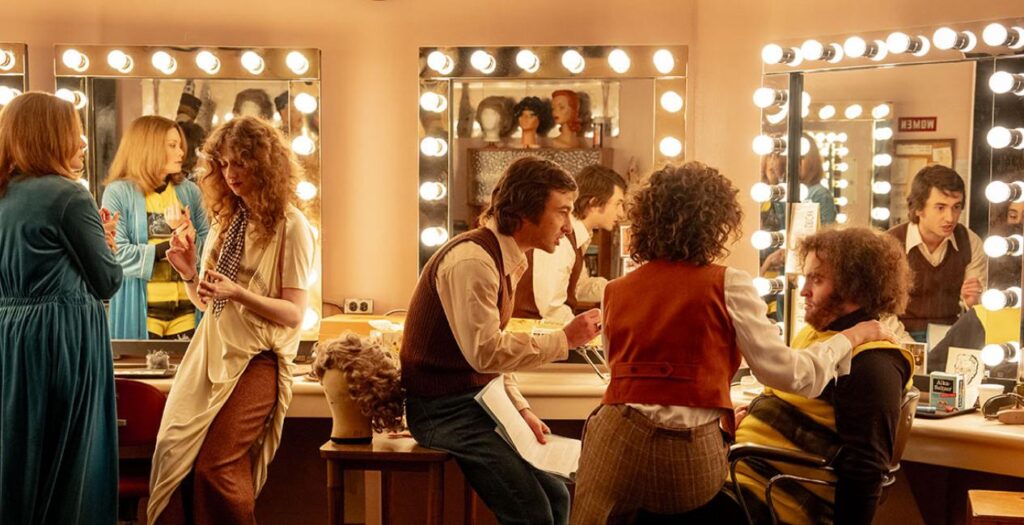The greatest flaw in Jason Reitman’s Saturday Night comes down to perspective. Regaling the premiere of Saturday Night Live on October 11, 1975, the film adopts the point of view of creator Lorne Michaels (Gabriel LaBelle, a 21-year-old only somewhat passing as a decade older). Michaels himself is synonymous with SNL and the cultural significance it would manifest over five decades of being on air. However, despite his prominence and the inability to separate him from the film’s core origin story, he makes for a lackluster point of view to prop the film on. There’s simply no real personality to carve a cinematic persona out of.
Adopting the playing out in real-time structure, Saturday Night tracks the 90 minutes leading up to air time for the first installment of what would become Saturday Night Live. That said, when anyone asks Lorne himself what the show will be, he keeps telling them that it’s hard to describe or that he knows all of the show’s ingredients but not the measurements.
All in all, he’s not quite sure what the show is, but he’s confident in his talent and believes it’s his big shot. However, as much as he believes in his cast and writing team, the studio is less than appreciative, ready, and willing to throw to a Johnny Carson re-run before letting the premiere crash and burn live, tarnishing the NBC “peacock way.”
Written by Reitman and Gil Kenan, this extended walk-and-talk takes us through the now iconic backstage of the studio as the cast and writers commit to frenetic artistry while the suits all puff on their cigars and hope for their downfall. Considering how, in recent days, Lorne Michaels is all too happy to invite notable racists and/or transphobic comedians to host, it’s easy to forget how radical the initial iteration of the sketch comedy series was. The comedians at the center were considered counterculture—fringe, even. They challenged how late-night television was consumed and who was behind it.
Though again, the Lorne in this script is such a non-entity that it requires his then-wife, Rosie Shuster (Rachel Sennott), to deliver a lengthy exposition about his backstory to fill in the blanks. Sennott is, as always, an electric performer but is failed by a script that doesn’t offer much about Rosie’s interiority. Cooper Hoffman, as his put-upon point guy, Dick Ebersol, is a much more engaging presence. Perhaps the film might’ve worked better had it adopted his point of view, a step apart from being a true insider but with believable panic while juggling the necessities of the studios with a creative who doesn’t understand that three hours’ worth of material isn’t conducive to a 90-minute window.
Luckily, the rest of the cast makes up for the flat protagonist (though LaBelle is perfectly fine, though much better in his previous biopic role, The Fabelmans). Cory Michael Smith as Chevy Chase, Matt Wood as John Belushi, Ella Hunt as Gilda Radner, Lamorne Morris as Garrett Morris, and Dylan O’Brien as Dan Aykroyd all have shining moments. O’Brien, in particular, is a highlight out of the main cast, possessing a winsome naturalism that combats the frenzy of the script and whip-pan heavy edits. Hoffman is, again, a highlight, and he showcases the easy, affable onscreen charm he brought to Licorice Pizza.
Other highlights include Tommy Dewey as original head writer Michael O’Donoghue, all slippery charm and biting words. Matthew Rhys makes a meal out of his few scenes as George Carlin, while Nicholas Braun hilariously plays double duty as both Andy Kaufman and Jim Henson. Waiting in the wings is Nicholas Podany, whose vocal inflections as Billy Crystal are genuinely uncanny.
The cast is so good, so quickly settling into their roles without it ever coming across like cheap mimicry that it makes the whole film all the more disappointing. There’s undoubtedly entertainment value in Saturday Night and plenty of laughs. However, the project as a whole results in something self-indulgent, less revealing, and introspective.
We all know that Saturday Night (later Saturday Night Live) goes to air and becomes a major cultural success. So, the air is let out immediately, and there is little tension about how or why the show works. We don’t learn anything new about the cast members, either. Instead, it acts as a highlight reel of signature historical moments—such as Belushi’s bee costume or Aykroyd in shorts being catcalled by women in hard hats.
It’s fun but soulless. For all of the magic the characters talk about making, there’s very little woven into the script or direction style. Reitman’s direction is keyed up but to a dizzying agree with dark frames and whiplash-inducing editing. It all works best when the cast comes together, such as when they rally to help an assistant out with a bad trip. The chaotic direction feels less artificial and more like the result of the characters’ energies, which it chronicles. Ultimately, Saturday Night needed a director who was less enticed by the idea of indulging in the mythology and instead ready to skewer it and strip it back.
Longtime fans of SNL will undoubtedly find something to love about Saturday Night. And, certainly, as agnostic as I am about the series, there are elements I appreciate and found fun and engaging. But the film’s triumph, eerily echoing the program when it’s at its worst, is the cast. It’s worth seeing these actors giving it their all, as long as you don’t mind leaving with nothing new to show for the time spent.
Saturday Night played as part of the 2024 Toronto International Film Festival and will hit theaters on September 27 for a limited release before a wide release on October 11 by Sony Pictures Releasing.
Saturday Night
-
Rating - 6.5/106.5/10
TL;DR
Longtime fans of SNL will undoubtedly find something to love about Saturday Night. But the film’s triumph, eerily echoing the program when it’s at its worst, is the cast. It’s worth seeing these actors giving it their all, as long as you don’t mind leaving with nothing new to show for the time spent.







